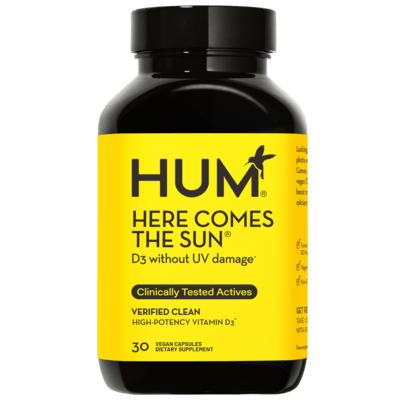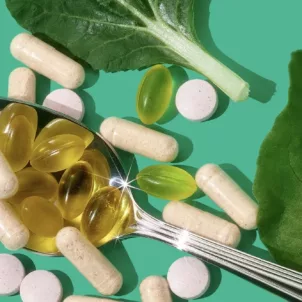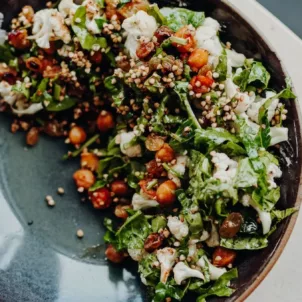Is Vitamin D Vegan? A Dietitian Breaks Down Everything You Need to Know
Gaby Vaca-Flores, RDN, CLE, explains the benefits of vitamin D and reveals if it exists in vegan form. Plus: She walks us through how to choose the best vegan vitamin D supplement.
Vitamin D has so many benefits: from improving mood to supporting your immune system to balancing hormones. But this vitamin can be tricky to come by, especially for vegans: You can get it from the sun or from foods (mainly animal-based products like egg yolks and fish). Prioritizing vitamin D intake is highly recommended for everyone, but especially if you follow a strict vegan or vegetarian diet. As you may already know, sunshine is a wonderful natural source of vitamin D that’s safe for omnivores and vegans alike. But most of us don’t get enough, so we need to rely on vitamin D food sources or supplements.
Sadly, many vitamin D-rich foods and supplements aren’t vegan. But vegan options do exist! Here’s how vitamin D can benefit your health and where to find vegan-friendly food and vegan vitamin D supplement sources.
Vitamin D Benefits
So, what is vitamin D good for? Vitamin D is widely recognized for its role in maintaining bone health by regulating calcium and phosphorus absorption.
Surprising to many, however, is vitamin D’s critical role in supporting other important physiological processes. These include but aren’t not limited to:
- Mood regulation
- Muscle retention
- Immunity protection
- Hormone balance
Risks of Vitamin D Deficiency
The reasons to avoid not getting enough vitamin D may just be as compelling the benefits of getting enough vitamin D.
A 2020 study warns that vitamin D deficiencies can put people at risk for skeletal issues and compromised bone health. This is because vitamin D helps with calcium and phosphorus absorption, both of which are key in supporting bone density and health. Another study suggests that there are strong associations between vitamin D deficiency and cognitive decline.
Less severe (but still unfavorable) consequences of low vitamin D intake include fatigue and potential hair loss.
In short, vitamin D is an essential nutrient for optimal health and should be a component of most healthy diets. For vegans and strict vegetarians, however, incorporating it into their daily diet can be tricky.
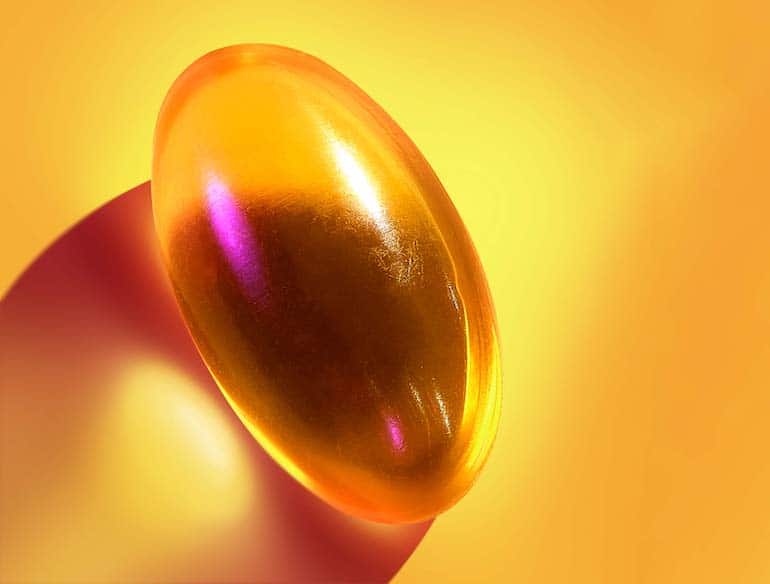
Sources of Vitamin D
The body receives vitamin D through three main sources: sunshine and skin absorption, food (either naturally occurring or fortified), and vitamin D supplements.
Vitamin D From Sunshine
Sunshine is the most natural way to synthesize vitamin D in the body. However, relying on the sun-to-skin method can increase the risk of skin damage, which is why it’s important to get vitamin D in other ways.
Vitamin D Food Sources
Vitamin D isn’t present in its bioavailable form in most plant-based foods. Consequently, many of the best food sources of vitamin D are in animal-based products like egg yolk, fatty fish, and liver. This makes vitamin D is often a challenging nutrient for vegans and vegetarians to consume adequately.
As such, vegans and vegetarians often have to rely on processed, fortified foods to contribute to their daily vitamin D intake. When food is fortified, it means that specific nutrients have been added to enhance its nutritional profile. Dairy and plant-based milk, juice, and cereal are often fortified with vitamin D. Eating vitamin D-fortified foods can be beneficial for vegans and vegetarians.
Vitamin D Supplements
Alternatively, you can take vitamin D supplements. They can help fill in potential nutrient gaps in your diet, particularly in those that increase the risk for nutrient deficiencies.
As a dietitian, I believe that one of the best ways to optimize vitamin D intake—especially for vegans and vegetarians—is through supplementation.
Non-Vegan vs. Vegan Vitamin D Supplements
Types of Vitamin D
There are two main types of vitamin D:
- Vitamin D2 (ergocalciferol)
- Vitamin D3 (cholecalciferol)
Of the two forms, vitamin D3 is the gold standard for supporting healthy vitamin D levels.
Calcifediol is a term that describes the final form of vitamins D2 and D3 once the liver breaks them down. Vitamin D status is a reflection of the blood’s level of calcifediol. Collectively, researchers have suggested that vitamin D3 is more effective in raising calcifediol levels than vitamin D2.
Unfortunately, the most common source of vitamin D in plants and fortified plant-based foods is vitamin D2. Similarly, many vitamin D supplements aren’t vegan because they rely on animal-based sources of vitamin D3 such as the skin of fatty fish and lanolin from sheep’s wool. If you follow a vegan diet, be sure to check the label to avoid these non-vegan sources in your vitamin D supplement.
The good news? HUM Nutrition’s Here Comes The Sun is a fully-vegan dietary supplement that contains vitamin D3. Simply take one each day with food to help support your body and your mood.
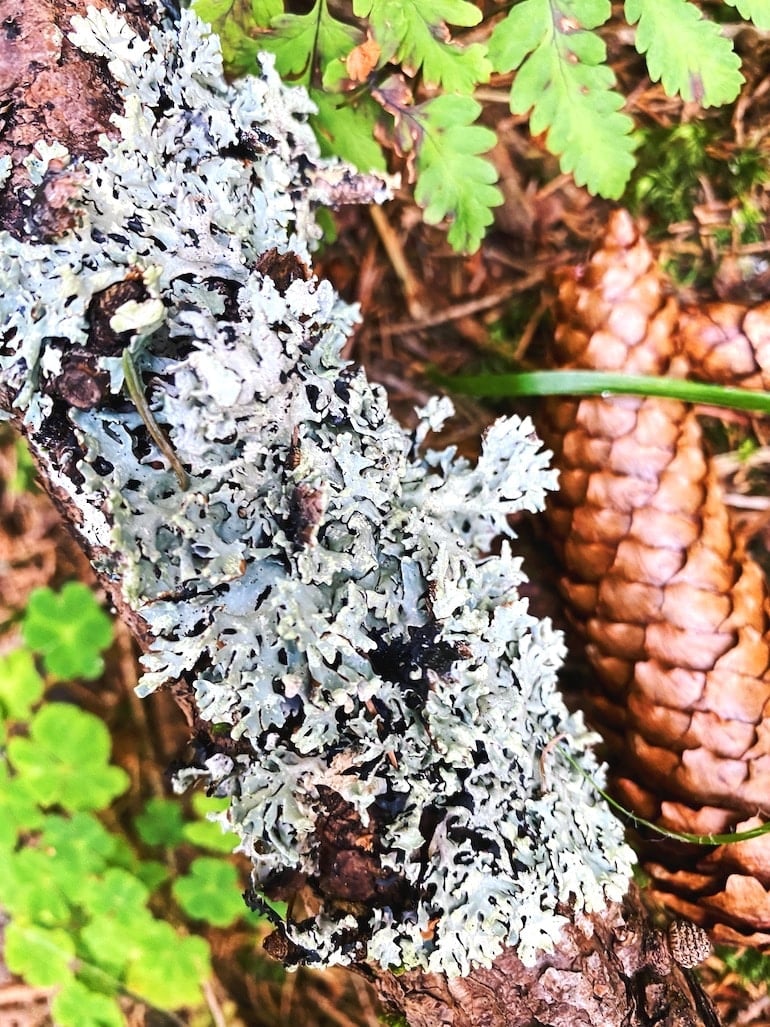
Lichen Vitamin D
How does HUM’s Here Comes The Sun contain this important nutrient? By using a quality, vegan-friendly source of vitamin D3 in their supplement: lichen.
Lichen is an algae-fungal hybrid microorganism. This small gray-yellow plant grows on trees and stones. It’s the only plant that contains vitamin D in its most bioavailable form: vitamin D3 cholecalciferol.
For this reason, vegans should look for lichen-based vitamin D supplements, like HUM’s.
How to Take Vitamin D
Before you search for the best vegan vitamin D supplement, it’s important to consider how to get the most out of your supplement routine.
Look For Fat
Vitamin D is fat-soluble. For this reason, taking it with fat can significantly enhance its absorption, thus maximizing its benefits.
I suggest looking for a vegan vitamin D formula that contains a fat component. We like to use extra virgin olive oil for best results.
Recommended Dose of Vitamin D
According to the National Institutes of Health, most adults should aim for a vitamin D daily dose of at least 600 IUs. However, experts believe this recommendation is too low and suggest that higher doses can lead to better health outcomes.
In fact, research shows that taking 2,000 IUs (or 50 micrograms) of vitamin D3 daily can help achieve better a vitamin D status. That said, I recommend finding a vitamin D supplement that contains 2,000 IUs of vitamin D3 in cholecalciferol, its most bioavailable form.
Lastly, you might be wondering how much vitamin D is too much. I don’t suggest exceeding 4,000 IUs per day—the tolerable upper limit for adults—without first consulting your doctor.
The Bottom Line
There actually are vegan sources of vitamin D. While they’re especially helpful for those on plant-based diets, they work just as well for people who eat animal products, too.
When shopping for a vegan vitamin D supplement, look for these three key traits:
- Check if it’s vitamin D from lichen vs. lanolin (in D3 cholecalciferol form)
- Ensure that lichen D3 contains a fat component (such as EVOO)
- Look for one that packs 2,000 IUs of vitamin D3 (cholecalciferol)
The days of asking yourself if vitamin D is vegan are over. With that said, if you’re a vegan, strict vegetarian, or are simply looking for a plant-based formula, be sure to get your hands on a vitamin D3 supplement sourced from lichen to reap all the benefits that the sunshine vitamin has to offer.
